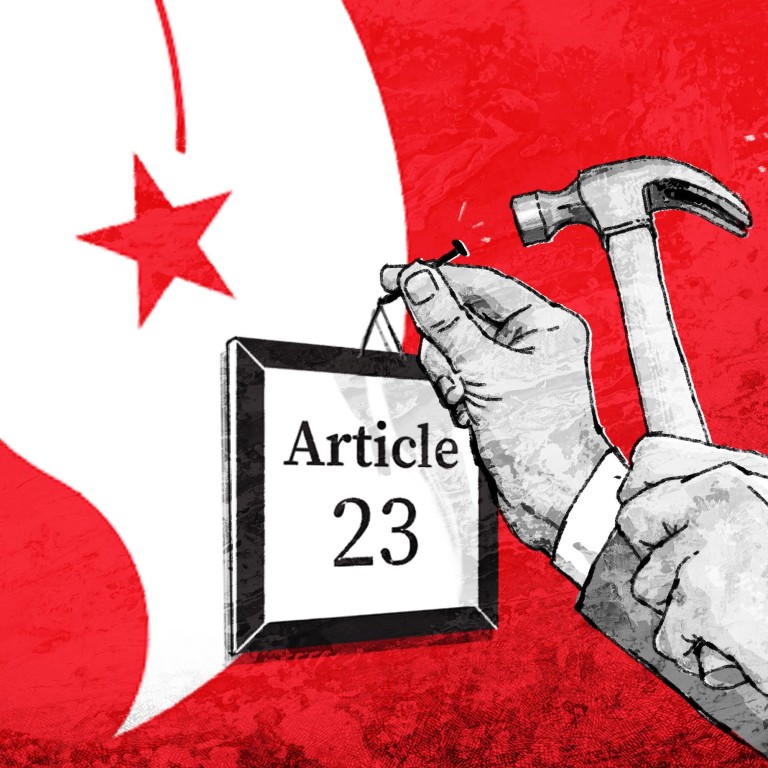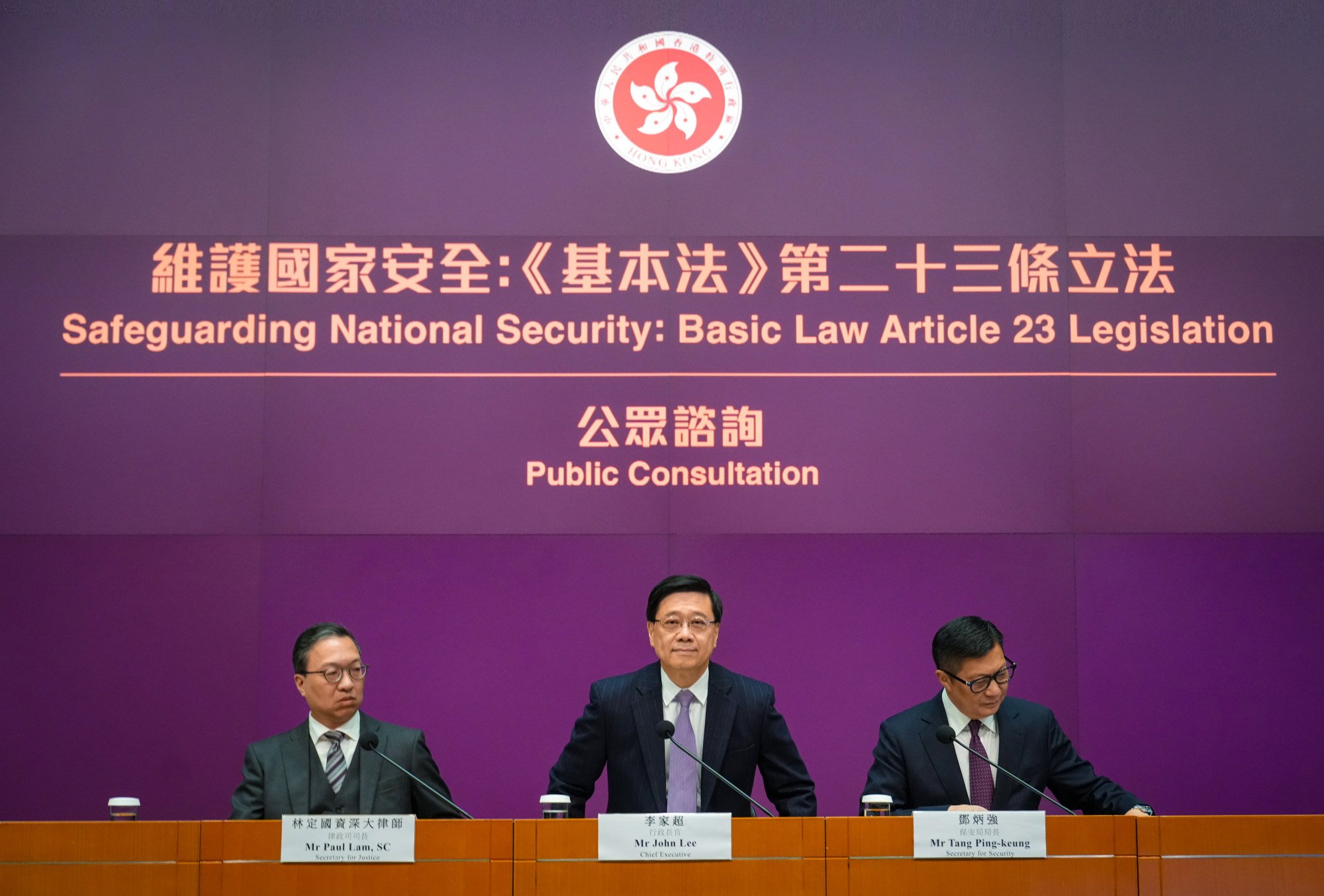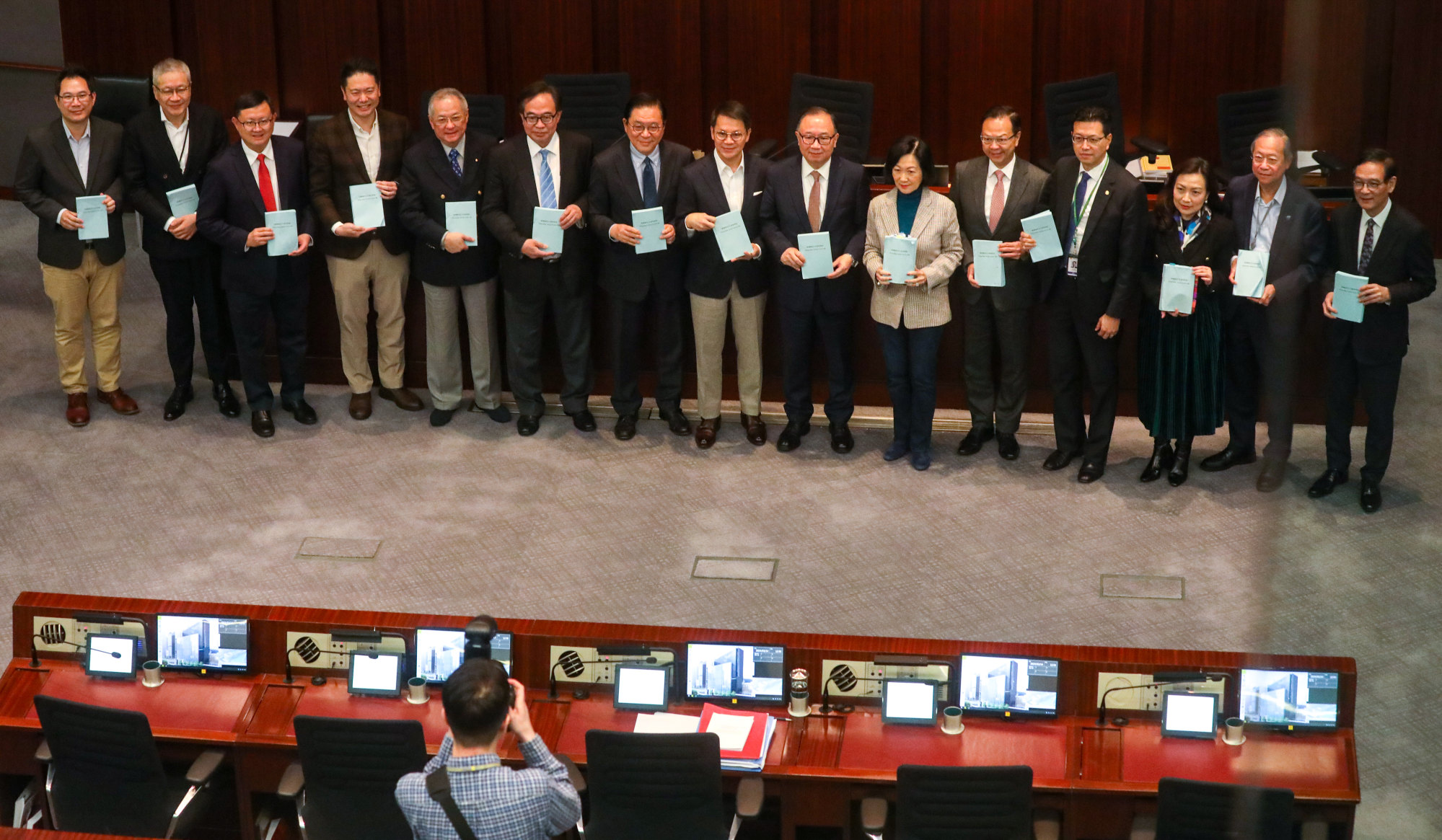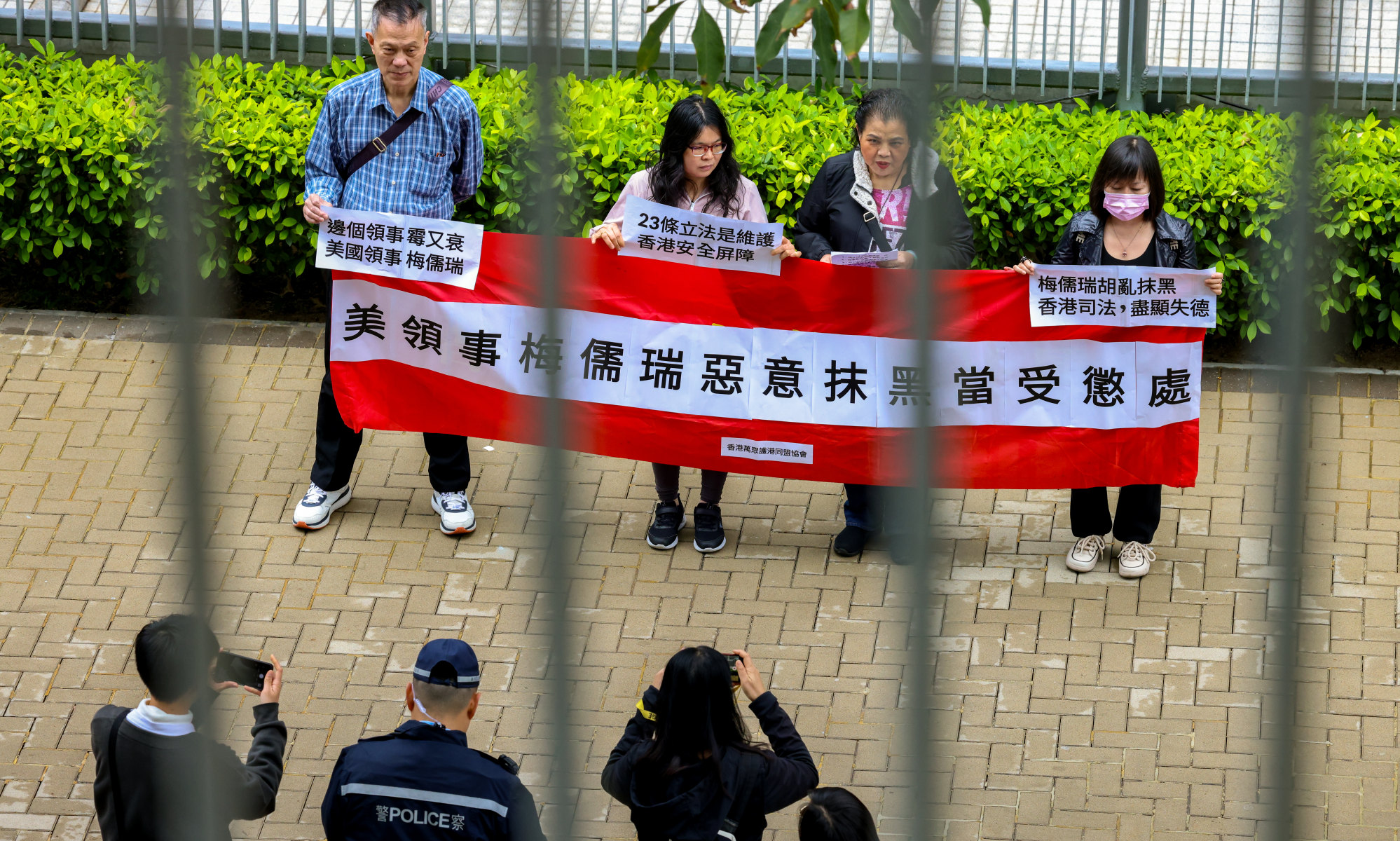
Exclusive | Why is Hong Kong fast-tracking its Article 23 domestic national security law? Catching enemies off guard among key reasons, sources say
- Insiders reveal calculated strategy to catch foreign powers off guard and curb impact of potential sanctions or smear campaigns ahead of passing of Article 23 bill
- But some worry over possibly weakened scrutiny and impact on city’s image just as authorities are ramping up global promotion efforts
The comment was uttered in jest, but there was a lot of truth to it when looking at the barrelling through of the bill in recent weeks. It all began in earnest on January 30 when the government launched a 110-page consultation document that set out the framework which updated and introduced new offences relating to national security.
The feedback exercise lasted a month. Authorities then summarised 13,000 public responses in nine days before presenting a bill to the local legislature on March 8, right smack during China’s annual political gathering in Beijing.
Legislators took six days to finish scrutinising the 181-clause bill that carries life imprisonment for at least four serious offences. Authorities then gave legislators just 11 hours to study amendments they issued late at night before submitting a revised bill the next day.
What explains the sudden speed of the passage of the legislation that was actually more than two decades in the making? Has it been good for the city or will there be a price to be paid? Analysts are left asking these questions as the law looks set to be passed sometime this week.

The Legislative Council will hold a full meeting on Wednesday, when the second reading of the bill could resume, after the House Committee agreed to waive a 12-day notice period.
The fast-tracking of the bill legislating Article 23 in the city’s mini-constitution, the Basic Law, was a bombshell for many in the establishment, including lawmakers and top advisers attending the “two sessions” in the capital. Nearly all whom the Post spoke to said they received very short notice to rush back to Hong Kong for relevant meetings.
From interviews with officials, politicians and analysts, as well as observations on the ground in Beijing and Legco in Hong Kong, the Post pieced together the reasons behind the urgency to pass the bill.
Insiders said for Hong Kong authorities, a swift enactment of the bill was a calculated strategy to catch foreign powers off guard and thereby minimise the potential impact and duration of any punitive actions or smear campaigns against the city.
A decision to get the bill out of the way quickly was made to allow the government to address Hong Kong’s economic woes and jump-start recovery after the Covid-19 pandemic, they said. Many in the business community also felt that with the Beijing-imposed national security law already in place since 2020, the city was used to the idea of legislation protecting the state.
But critics were not persuaded.
The hurried enactment of what they described as “the most significant piece of criminal law legislation since the 1997 handover” could compromise the quality of scrutiny, they said. And not taking enough time to sufficiently assuage concerns could hurt the city’s image at a time when it was trying to burnish rather than burden its role as an international hub.
Hong Kong auditors want clarity over fears of work caught by Article 23 law
Behind closed doors: ‘pack a bag for urgent travel’
Days before the bill was launched, a sudden flurry of activity ensued among Hong Kong delegates in Beijing for the two sessions.
The chief executive and the politicians were in the capital preparing for key meetings with Beijing officials overseeing Hong Kong affairs when word got around they had to be prepared for changes in their programme.
A lawmaker recalled a conversation with his colleagues. “I was reminded to pack a bag for urgent travel.”
“Are you sure we can miss the meeting with [Vice-Premier] Ding Xuexiang tomorrow?” he said he asked. “The answers were elusive.”
On the afternoon of March 6, 10 lawmakers were abruptly summoned back to Hong Kong for special Legco meetings to be held the following day. A few departed without their luggage, racing against time and thinking they could head back north later.
Meanwhile, Lee, on his second day in Beijing, cut short his three-day trip, citing early completion of ministry visits.
Top advisers on Hong Kong’s Executive Council, a body that assists the chief executive in making decisions, faced a similar predicament in Beijing. They were told to rush back to endorse the bill before the government gazetted it.
“Flights to Hong Kong were full that night. I flew to Shenzhen, touched down after midnight, to standby for the special meeting,” one Exco member said.
Soon after the meeting took place on Thursday afternoon, the bill was gazetted and introduced to the legislature on Friday. Back-to-back meetings were conducted for six days in a row for a clause-by-clause scrutiny.

‘Pass it this month at all costs’
Since taking office in July 2022, Lee had spoken of the need to fulfil Article 23. Last year, he vowed it would be completed “no later than 2024”. But last month during the consultation exercise, he stressed the need to pass it “as early as possible”.
April 15 had been floated as an internal target. The date holds symbolic significance as it coincides with the National Security Education Day.
Still, many were caught off guard when told the timeline was sped up. Lawmakers did not believe at first there was a “hard deadline” set by the central government.
Yet, a source close to Beijing said recent closed-door briefings by key mainland Chinese officials overseeing Hong Kong’s affairs in the capital pushed Lee’s administration to accelerate the bill’s passage.
Ding and Hong Kong and Macau Affairs Office director Xia Baolong met delegates on several occasions during the two sessions. Their message was clear: speedy legislation would allow the city to concentrate on developing the economy.
Top officials in Hong Kong, at one point, reviewed the schedule and set a new target to pass the bill within this month “at all costs” with no room for delay, the source said.
A government insider said the fast-tracking plan and the draft bill were kept to a very small working group of about 20 people, drawn mainly from the Department of Justice and the Security Bureau.
They “worked around the clock” during the consultation period to sift through submissions, funnelling relevant ones to the justice department for further consideration, the source said.
Most officers in the Information Services Department, an outfit meant to assist policy delivery, were unaware of the fast-tracking “due to the sensitivity of the topic”, the person said. Unlike many key policies, the contents of the security bill were not passed to these officials to produce publicity materials.
‘Subsidiary legislation in Hong Kong’s Article 23 law can address risks swiftly’
The source added that the core group’s work schedule continued to be intense when the bill came under scrutiny from lawmakers. They raised a range of issues but one key change they proposed on tightening the rules on absconders resonated with the frontbench.
Just a day after lawmakers raised the amendment, security chief Chris Tang Ping-keung on Tuesday said the government was considering removing a requirement listed on the bill that said a suspect could be deemed an absconder six months after a warrant expired.
The insider said this was the result of officials “working overnight” to study the feasibility on Monday.
Similarly, another key amendment empowers the chief executive to make subsidiary legislation “for unforeseen circumstances” in a timely manner. Tang sought to defuse concerns on Friday, clarifying that the city leader would not invoke the new clause “randomly” and would work within the remit of the main ordinance.

‘Surprise’ could minimise impact of possible sanctions
The “surprise element” to the fast-tracking of the bill was important, according to a pro-Beijing heavyweight, who said the tactic would catch foreign powers unprepared. Any decision to enact sanctions, for example, would take time to push through given their own countries’ packed agenda.
The 15 lawmakers sitting on the bills committee privately mocked themselves as “martyrs”, the politician said, referring to their “readiness” to face sanctions or other restrictions imposed by Western governments.
“If a new round of sanctions looms, the law will already be enacted,” he said. “The actions won’t scare them off. There will be fewer talking points either with the bill passed.”
In August 2020, a month after Beijing imposed a security law in Hong Kong, the US Department of the Treasury imposed sanctions on officials for allegedly undermining the city’s autonomy.
To this day, those sanctioned, including John Lee and Chris Tang, have trouble using credit cards in Hong Kong and cannot step on American soil.
“Article 23 legislation provided America and its Western allies with the ‘most powerful’ ammunition,” said Lau Siu-kai, a consultant for Beijing’s semi-official think tank, the Chinese Association of Hong Kong and Macau Studies. “As the US presidential election unfolds, it’s wishful thinking to expect signs of de-escalating their smear campaigns against China.”
“It’s practical for Hong Kong to cut short the time for them in planning campaigns.”
Hong Kong Article 23 law won’t ‘alter confidential nature of church confessions’
Diplomatic murmurings
The Basic Law’s Article 23 stipulates that the city’s government should enact laws “on its own” to ban any act of treason, secession, sedition, subversion against the central government, or theft of state secrets.
So far, major concerns raised at home and abroad were over the law’s “broad and vague” definitions of key terms such as “state secrets” and “external interference”.
Last month, the US Department of State said the law could be used to stamp out dissent and its proposed long-arm jurisdiction might be exercised to “intimidate and restrict” Americans.
British Foreign Secretary David Cameron also weighed in as the feedback exercise concluded, urging Hong Kong to reconsider the plan and “engage in genuine and meaningful consultation”.
The official feedback exercise concluded on February 28. Behind the staggering 98 per cent-plus support that the authorities touted, some told the Post they had reservations but chose to remain muted.
The expatriate community had expressed concerns about the scope of the new legislation, more than one diplomat in Hong Kong said. However, consulates would not go high-profile until the law was formally passed, one said.
One from a European country emphasised “the need for caution”. Unlike the law decreed by Beijing, Article 23 is a local legislation mandated by Hong Kong’s mini-constitution.
“We need to navigate the fine line of avoiding accusations of interference in internal affairs and ensuring compliance with diplomatic norms,” the diplomat said.
The Post learned that European Union countries jointly submitted their concerns to the local government towards the end of the consultation period, but soon received critical feedback from the commissioner’s office of China’s foreign ministry in the city.
A second European diplomat said urgent meetings were held separately on how they should brief their nationals. As a result, one of the sessions held in the past week saw consular staff walk through precedents of national security cases on the mainland.
“We won’t ask our nationals to leave Hong Kong. But there is not much we could do in helping them gauge the impacts of the law ,” he said.

Full speed ahead but at what cost?
On Thursday, lawmakers approved moving Article 23 from the bills committee to the House Committee, after endorsing the amendments with some effectively making the legislation tougher than the original proposals.
Martin Liao Cheung-kong, who chairs the bills committee, said lawmakers had already vetted the bill “carefully and critically” as they spent an average of eight hours every day on meetings.
“I allowed everyone to ask whatever they wanted to ask during the vetting process, leaving no stone unturned,” he told the Post.
But Professor Simon Young Ngai-man, a legal expert at the University of Hong Kong (HKU), warned such haste could come at a cost.
“There are many technical issues of criminal law, procedure and evidence, and I believe Legco members would benefit from hearing views from legal practitioners and academics,” he said.
“[Rushing the bill] seems inconsistent with the spirit and practice of rigorous debate and careful deliberation that we have come to expect from Legco.”
What are some of the key legal flashpoints under Hong Kong’s Article 23 law?
Fast-tracking without thorough scrutiny could cause residents to question the role of the legislature, said John Burns, honorary professor at the department of politics and public administration at HKU.
He said lawmakers did not sufficiently address concerns about the vague key terms of the bill. Instead, the focus centred on advocating harsher treatment for residents “potentially ensnared in the national security web”, he said.
Burns said residents might legitimately ask: “What, then, is the role of Legco overhauled by Beijing?”
The central government has implemented changes to Hong Kong’s political system to ensure only “patriots” hold office.
“Legco represents a narrow range of ‘official patriot’ opinion,” he said. “This is a dangerous position because the government needs broad support to govern effectively.”

Legislation and then economic take-off?
The passing of the law could mean the start of a real test of Hong Kong’s wisdom. Will plugging the security “loophole” propel the city towards economic prosperity, while preserving its freedoms and liberties, as repeatedly promised by the city’s leaders?
Business tycoon Allan Zeman said he agreed wholeheartedly with the assertion.
“Whatever we do, if we take a longer time, we will get criticism,” the chairman of Lan Kwai Fong Group said. “Pass it, move on, and start on other things that are important to the city.”
Political analyst Lau was not too worried either. He said the city’s robust emphasis on national security had been “well digested” overseas over the past four years since Beijing imposed the related law.
“Among the some 300 individuals accused of endangering national security, can you name one prominent overseas investor, academic and professional,” he asked.
“The domestic law will also stand the test of time.”
However, sceptics argued that the anxiety created in international communities was already dragging down the city’s reputation just as it was about to move on beyond the Beijing-imposed national security law.
Chong Ja Ian, an associate professor of political science at the National University of Singapore, cautioned that there could be an adjustment period as outsiders used the mainland’s security laws as a reference point – causing them to worry – before Hong Kong’s legislation could be tested in court.
“Such conditions may make non-Chinese firms more hesitant about exposure to the Hong Kong market,” he said.
He added the ongoing geopolitical tensions could continue to trouble Hong Kong even if it wanted to set its sights only on the economy.
“I am not sure how the enactment of the law can enable Hong Kong to move on and focus on the economy while avoiding friction with the US,” he said.
Additional reporting by Willa Wu


